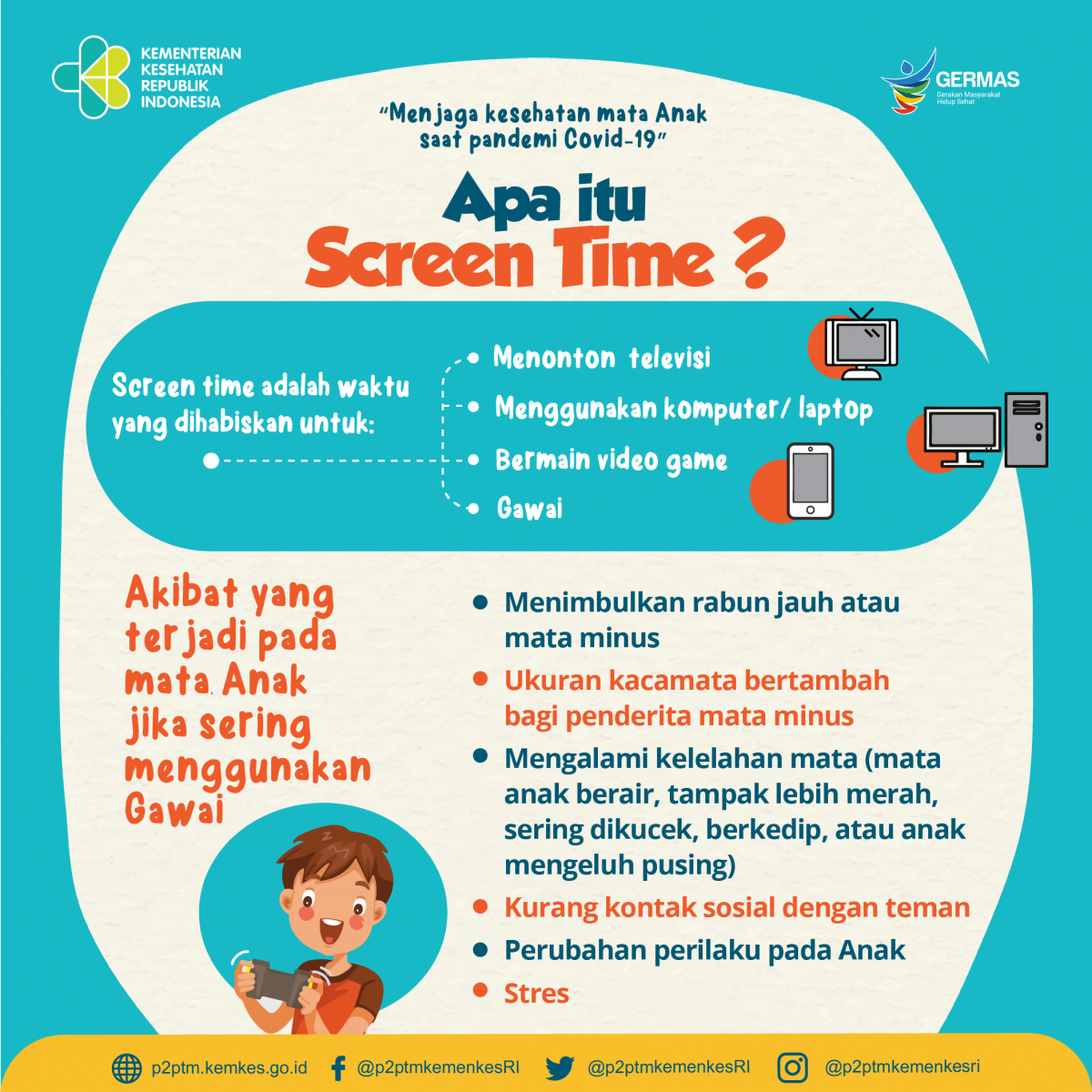The internet is abuzz with a viral video of a mother who uploads of her child, still under-five-year old, with a swollen eyes. The mother writes that the child spent too much time on mobile phones. This is why this article is so important.
What is a Screen Time? Screen Time is time spent on: watching television, use a computer of laptop, play video games, mobile phones. Cited from instagram account edufic.id, mobile phone radiation is classified as "potential carcinogen" in by the International Agency for Research on Caster, a part of the World Health Organization (WHO).
To reduce the impacts of radiation, there are three recommendations:
1. Offer safe distance and use-time. Ideally, move devices a minimum of 20-30 cm from body. Study indicates that electromagnetic radiation decreases significantly with increased distance from sources of radiation. The more distance, the less radiation exposure. In addition, it would be better not to use wireless devices more than one hour each day to reduce cumulative radiation exposure.
2. Use device with a cable
Use devices with a cable as much as you can. Change wireless headphones with cables. Choose keyboards, mouses, and microphones attached with a battery-operated cables.
3. At Nighttime.
When the device is not used, turn it off or switch to flight mode. If necessary, children are advised to sleep away from the gadget. When possible, move away electronic devices from bedroom, including TV and audio. Use electric alarm or battery-operated alarm unconnected to a wi-fi. Let a child have an alarm clock if the child needs to wake up early.
Dr Dono Baswardono also suggest the same thing in his Instagram account @dr. Dono. He writes that the impacts of excessive screen time on children may be: 1) speech delay, particularly in babies and under-five-year old children, 2) disturbed wake-up pattern. Many under-five-year old children experiences nightmares or interrupted sleep, 3) mental health problem, anxiety, changes in mood, unhealthy emotional regulation, and tantrum, 4) disturbed brain development particularly in the dominant frontal cortex and amygdala, 5) sedentary lifestyle, preference to be alone and lazy, or lying down, which risk metabolistic diseases i.e. obesity, hypertension, and heart problem, and 6) effects on academic performance, superficial concentration, lack of focus, and short-attention span.
It is extremely difficult to get mobile phones away from Gen Z and Alpha. Parents authority may help impose a healthy screen time. The rules are as follows: a) no screen time for babies and under-five-year old children, except for a video call with parents while they are at work, b) for under-five-year old children, a maximum of one hour.
Speech Delay – one of the impacts
In live-streaming, a resident psychiatrist, dr. Novahendra Murdani introduces a resource person, dr. Yunita Handayani Gusmira, Sp. A. who says that the Women’s and Children’s Book provides a guide on speech delay, which usually starts when a child turns two. The book suggests that screen time is often the cause of speech delay, and it recommends medical rehabilitation as the intervention
Parents often believe that “a content is good.” Often, content can provide stimulation, but in reality it is causing speech delay. Parents should talk to babies when right from the beginning.
Then what would parents do when they find a child with a speech delay? They can go to a first-tier health facility, and when necessary a referral to a specialist.
Parents may provide screen time when a child turns two years. Parents, however, need to accompany the child and stimulate the child by asking questions, such as “What are you looking at?” In other words, there should be monitoring.
Book reading is another way to stimulate a child. Parents could start reading as their child turns three months.
Often, it was ‘practical’ for parents to give a mobile phone to their child because then the child is preoccupied and parents can do their work undisturbed. Some people suggest that this could delay a child’s ability to start speaking.
The author interviews Iis, a mother of a four-year old child. She says that she did not impose any online restriction to her then three-year old child. Her child becae addicted, and she took her child to a doctor for an examination. The doctor said that her child showed a change in behaviour, became more sensitive, got angry more easily, and had difficulty concentrating. The doctor recommended that the child be brought to a clinic for a therapy. After a year, the child showed positive progress. (Astuti)












